- Home
- Cryptocurrency
- Is Crypto Regulated in Nigeria? What You Need to Know in 2025

Is Crypto Regulated in Nigeria? What You Need to Know in 2025
Nigeria Crypto Business License Eligibility Checker
Check if your business meets the requirements for operating a licensed crypto platform in Nigeria under the 2025 Investments and Securities Act.
Business Eligibility Check
Requirements Summary
You must meet ALL of the following requirements to operate a licensed crypto platform in Nigeria:
- Minimum ₦500 million (about $335,000) paid-up capital
- Fidelity bond to cover customer losses
- Registration as a Nigerian company
- Physical office in Nigeria
- Nigerian citizens in key management roles
The SEC began issuing provisional licenses in late 2024. Only two platforms (Bushi and Quidax) have been approved so far.
Nigeria used to be a wild west for cryptocurrency. Banks blocked transactions. Accounts got frozen. People traded in the shadows. But that changed in 2025. Today, crypto is fully regulated in Nigeria - not banned, not ignored, but officially overseen. If you're trading, investing, or running a crypto business here, you need to understand how the system works now.
How Nigeria Changed Its Crypto Rules
In March 2025, President Bola Ahmed Tinubu signed the Investments and Securities Act (ISA) 2025. This wasn’t a tweak. It was a full rewrite of the country’s financial rules. For the first time, cryptocurrencies were legally recognized as securities. That means they’re treated like stocks or bonds - not just digital tokens, but financial instruments subject to oversight. Before this, the Central Bank of Nigeria (CBN) had banned banks from dealing with crypto in 2021. The ban didn’t stop people from using crypto - Nigerians still sent over $92 billion in crypto value between July 2024 and June 2025. But it made life hard. No bank accounts. No clear rules. No protection. The 2025 law ended that chaos. The CBN lifted its ban and released its own guidelines for Virtual Asset Service Providers (VASPs). Now, banks can legally open accounts for licensed crypto firms.Who Controls Crypto in Nigeria?
The Securities and Exchange Commission (SEC) is now the main regulator. They handle everything from exchanges to token sales. But it’s not just them. The CBN still manages payments and currency-related activities. The Economic and Financial Crimes Commission (EFCC) and Nigerian Financial Intelligence Unit (NFIU) track money laundering. And the National Anti-Money Laundering Act was updated to include virtual assets. This multi-agency setup is unusual. Most countries put crypto under one regulator. Nigeria spread it out. That means businesses have to deal with multiple sets of rules. If you’re running an exchange, the SEC wants you to meet capital requirements. If you’re offering crypto-to-naira trading, the CBN has its own rules. It’s messy, but it’s designed to cover all angles.What Do You Need to Operate Legally?
If you want to run a crypto exchange or wallet service in Nigeria, you must get a license from the SEC. The process isn’t simple. You need:- A paid-up capital of at least ₦500 million ($335,000)
- A fidelity bond to cover customer losses
- Registration as a Nigerian company
- A physical office in Nigeria
- Nigerian citizens in key management roles

What’s Allowed - and What’s Not
You can legally buy, sell, and trade Bitcoin, Ethereum, and other cryptocurrencies through licensed platforms. NFTs are allowed too - but only if they’re sold as investments. If you’re selling digital art with no financial promise, you’re fine. But if you’re marketing an NFT as a way to earn returns, it’s treated like a security. That means it needs SEC approval. Ponzi schemes are banned. Period. The SEC can now access telecom records to track down fraudsters. They’ve already shut down several fake investment apps. If you’re running a “crypto yield farm” that promises 10% weekly returns, you’re breaking the law. Peer-to-peer (P2P) trading is still allowed. You can still buy crypto from someone on WhatsApp or Telegram. But if you’re doing it at scale - like running a P2P marketplace - you need a license. The law doesn’t target individual users. It targets businesses.What About Taxes?
Crypto isn’t tax-free. In June 2025, Nigeria passed the National Tax Administration Act (NTAA) 2025. It takes effect in 2026. Under this law, VASPs must report all transactions. Users must declare crypto gains as income. If you sell Bitcoin for a profit, you owe tax. Penalties are steep. A VASP that doesn’t file on time gets fined ₦10 million ($6,693) in the first month. For every month after that, it’s another ₦1 million ($669). The SEC can suspend or cancel a license if a company doesn’t pay. This isn’t a warning. It’s enforcement.
How Are People Reacting?
Nigerians are still among the biggest crypto users in the world. Over 20 million people own digital assets. Many bought crypto during the ban, using P2P platforms to bypass banks. Now, with legal clarity, some are moving to licensed exchanges. Others are nervous. Concerns are real. People worry about surveillance. The government can now track telecom data linked to crypto transactions. Some fear this could lead to overreach. Others are frustrated by the cost of compliance. A small startup can’t afford ₦500 million in capital. That means big players like Busha and Quidax have an advantage. The market could become dominated by just a few. Still, most users say they prefer regulation over uncertainty. No more frozen accounts. No more guessing if a transaction is legal. The rules are clear - even if they’re strict.What’s Next for Crypto in Nigeria?
More licenses are coming. Dozens of companies are in the application pipeline. The SEC is expected to approve more platforms in 2026. The government is also working on integrating crypto into the broader financial system. Think digital naira wallets that support crypto swaps. Or fintech apps that let you pay bills with Bitcoin. Nigeria is positioning itself as Africa’s crypto hub. It’s not just about control - it’s about opportunity. The regulatory framework is designed to attract foreign investment. It’s meant to create jobs. And it’s built to bring the unbanked into the formal economy. But success isn’t guaranteed. If the rules become too heavy-handed, users might go back to the shadows. If licensing stays slow, innovation could stall. The real test isn’t whether crypto is legal - it’s whether the system works for everyday people.What Should You Do Now?
If you’re a user: Use licensed platforms. Busha and Quidax are your safest options. Avoid unregulated apps. Even if they offer better rates, you have no legal protection. If you’re a business: Start the licensing process now. Talk to a Nigerian lawyer who understands both securities law and crypto. Don’t wait. The SEC isn’t going to make this easier. If you’re an investor: Watch the tax changes. The NTAA 2025 will hit in 2026. Start keeping records of every trade. You’ll need them. Crypto isn’t going away in Nigeria. It’s here to stay - and now, it’s under the law.Is cryptocurrency legal in Nigeria in 2025?
Yes, cryptocurrency is fully legal in Nigeria as of 2025. The Investments and Securities Act (ISA) 2025 officially recognized digital assets as securities, ending years of regulatory ambiguity. The Central Bank of Nigeria also lifted its ban on crypto transactions, allowing banks to serve licensed crypto businesses.
Who regulates crypto in Nigeria?
The Securities and Exchange Commission (SEC) is the primary regulator for crypto exchanges, token sales, and investment products. The Central Bank of Nigeria (CBN) oversees payment-related activities, while the EFCC and NFIU handle fraud and money laundering. Multiple agencies work together, making compliance complex but comprehensive.
Do I need a license to trade crypto in Nigeria?
Individuals don’t need a license to buy or sell crypto for personal use. But if you operate a platform - like an exchange, wallet service, or P2P marketplace - you must get a license from the SEC. Unlicensed businesses face fines, shutdowns, and criminal charges.
Are there taxes on crypto in Nigeria?
Yes. The National Tax Administration Act (NTAA) 2025, effective in 2026, requires crypto gains to be reported as income. VASPs must report all transactions. Failure to comply results in penalties of ₦10 million ($6,693) for the first month, plus ₦1 million ($669) per additional month. The SEC can suspend licenses for non-compliance.
What happens if I use an unregulated crypto platform?
Using an unregulated platform doesn’t make you personally illegal - but you have no legal protection. If the platform gets shut down or scams users, you can’t seek help from regulators. Your funds may be lost with no recourse. Licensed platforms like Busha and Quidax are the only ones backed by government oversight.
Can I still do P2P crypto trading in Nigeria?
Yes, peer-to-peer trading between individuals is still allowed. You can buy or sell crypto via WhatsApp, Telegram, or in person. But if you operate a P2P marketplace - even online - you must get a VASP license from the SEC. The law targets businesses, not casual users.
Why did Nigeria change its crypto laws?
Nigeria’s crypto market grew to $92.1 billion in value between July 2024 and June 2025, making it one of the largest in the world. The old ban didn’t stop adoption - it just pushed it underground. The government realized regulation was better than prohibition. The new laws aim to protect users, attract investment, and create jobs in fintech.
Are NFTs regulated in Nigeria?
Artistic NFTs - like digital art or collectibles - are not regulated unless marketed as investment products. If you’re selling an NFT with promises of profit, dividends, or resale value, it’s treated as a security and must be registered with the SEC. Otherwise, it’s treated like any other digital file.
Cormac Riverton
I'm a blockchain analyst and private investor specializing in cryptocurrencies and equity markets. I research tokenomics, on-chain data, and market microstructure, and advise startups on exchange listings. I also write practical explainers and strategy notes for retail traders and fund teams. My work blends quantitative analysis with clear storytelling to make complex systems understandable.
Popular Articles
13 Comments
Write a comment Cancel reply
About
DEX Maniac is your hub for blockchain knowledge, cryptocurrencies, and global markets. Explore guides on crypto coins, DeFi, and decentralized exchanges with clear, actionable insights. Compare crypto exchanges, track airdrop opportunities, and follow timely market analysis across crypto and stocks. Stay informed with curated news, tools, and insights for smarter decisions.

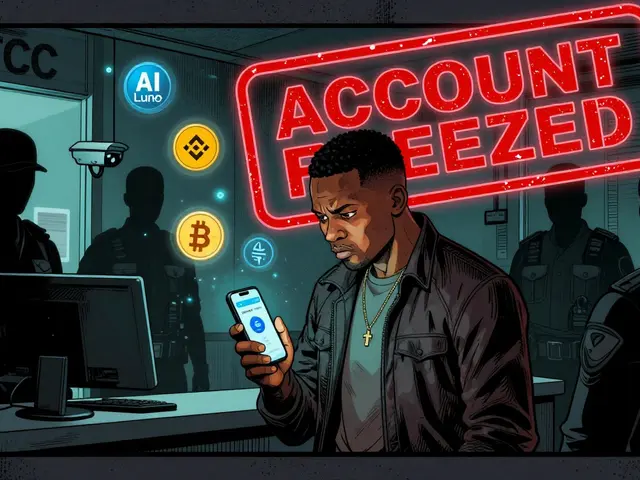

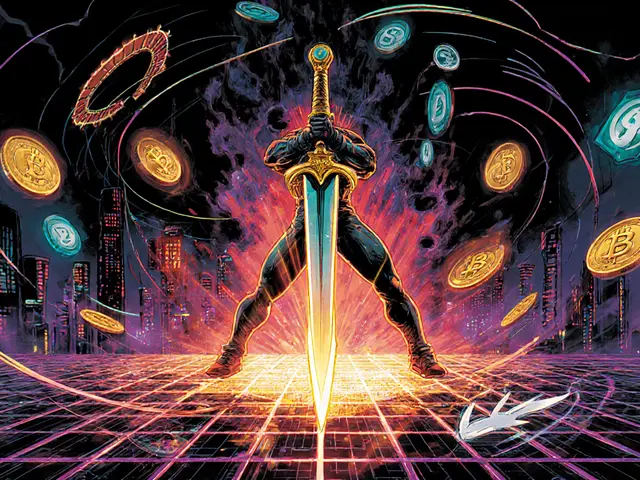
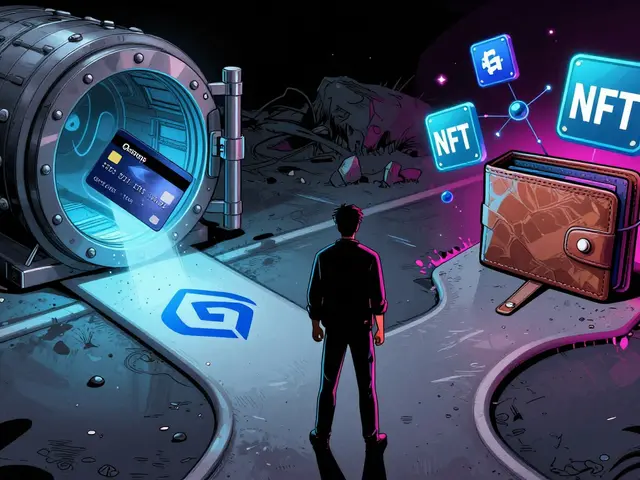

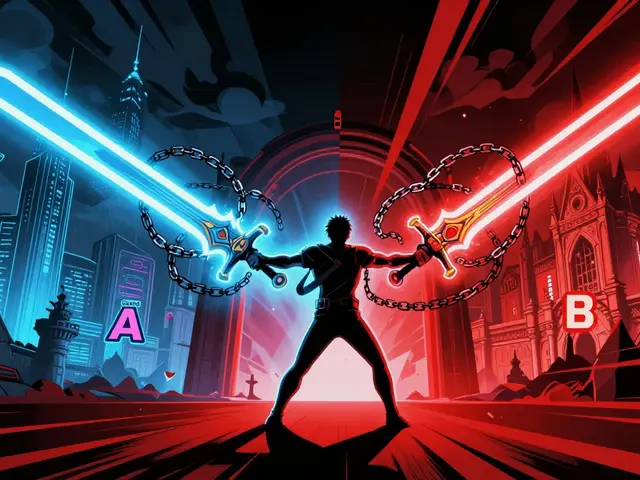

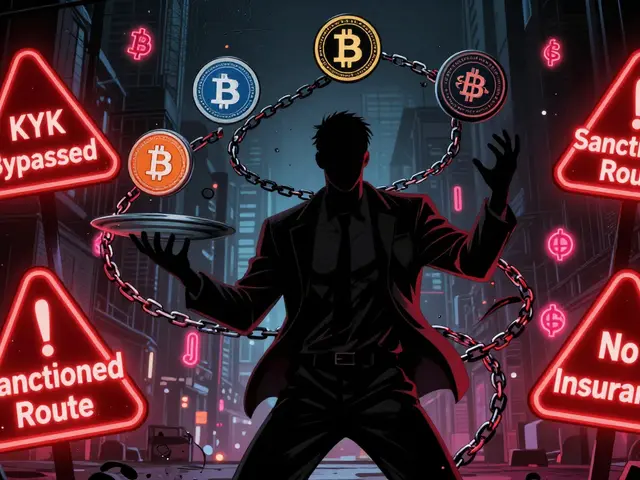
This is exactly why America needs to stop being soft on crypto regulation. Nigeria got it right-no more shadow markets, no more scams, no more excuses. If you're running a business, you pay the price. That's capitalism, not chaos. The SEC isn't being oppressive-they're protecting people from themselves. Stop crying about 'overreach' when your own neighbors are getting scammed daily.
And yes, I'm talking to you, P2P purists. You think WhatsApp trading is freedom? It's just unregulated predation with better Wi-Fi.
Man I’ve been watching Nigeria’s crypto scene for years and honestly this feels like the first real step toward maturity. Not perfect, sure-but at least now there’s a path forward. Used to be you’d buy BTC and hope your bank didn’t freeze your account next week. Now you know where you stand.
Still gotta watch how they handle the small guys though. That ₦500 million capital requirement? That’s basically a wall for anyone who isn’t already rich. Hope they soften it soon.
So let me get this straight-Nigeria banned crypto, people ignored it, then when it got too big to ignore they just slapped a regulatory label on it like it was a tax form? Classic. The whole thing feels like a power move disguised as progress. The SEC doesn’t care about users-they care about control. And now they’ve got telecom logs, transaction trails, and a checklist longer than my last breakup text.
Meanwhile, I’m over here buying ETH with cash in a parking lot and laughing. The system’s rigged, but at least it’s entertaining.
Big respect to Nigeria for not pretending crypto could be killed by banning it. Tried that, failed, then did the hard thing-regulated it. Not easy. Most countries still stuck in denial. Here, even small traders know the rules now. No more guessing. That’s huge.
Still, the licensing cost? Oof. Hope they make a tiered system soon. Not everyone needs to be Busha.
The regulatory framework in Nigeria is one of the most comprehensive in the developing world. The separation of duties between SEC, CBN, EFCC, and NFIU creates layered accountability. While this increases compliance burden, it also reduces regulatory arbitrage. The capital requirements, while high, ensure operational integrity. The tax reporting mandates under NTAA 2025 align with global best practices for digital asset taxation. This is not overreach-it is responsible governance.
It’s interesting how the government chose to regulate instead of ban. That says something about how deeply crypto is woven into daily life there. I don’t agree with all the rules but I get why they did it. People needed protection. The old system was dangerous. Now at least there’s a way to seek help if something goes wrong.
Still, I worry about surveillance. Just because you can track something doesn’t mean you should.
Let’s be real-this isn’t regulation. This is a corporate takeover dressed up as public policy. Busha and Quidax didn’t earn their licenses-they outspent everyone else. The rest of us? We’re just collateral damage in their IPO dreams. You think the SEC cares about Joe who wants to trade 0.1 BTC? Nah. They care about the next unicorn. And guess what? It’s not you.
Meanwhile, I’m still using Binance P2P. At least they don’t ask for my birth certificate.
Yessss this is the energy I needed today 😊
Nigeria didn’t give up on crypto-they upgraded it. People were already using it. So instead of fighting reality, they built a system around it. That’s smart. Yeah the rules are strict but at least you know where you stand. No more ‘my account got frozen again’ drama.
Also-taxes are coming. Start saving receipts. You’re welcome.
The ontological shift here is profound. Crypto was once an extralegal artifact-a digital nomad existing outside state sovereignty. Now it’s been domesticated, commodified, and integrated into the apparatus of financial governance. The ISA 2025 doesn’t merely regulate-it reifies. It transforms the token from a cryptographic promise into a juridical instrument. The CBN’s involvement signals the reassertion of monetary authority over decentralized networks. This is not innovation-it’s colonization by bureaucracy.
And yet… the people still trade. Always do. The state can license the platforms, but it cannot license desire.
Good move. Now if only they’d make licenses cheaper. Small teams can’t afford ₦500M. Big firms will own everything. That’s not freedom. That’s monopoly with a badge.
But hey-at least I can cash out without my bank calling me a criminal now. Small wins.
Let me be perfectly clear: Nigeria’s regulatory model is the only sane approach in a world where people treat crypto like a lottery ticket and call it ‘financial freedom.’ The fact that they’re enforcing capital requirements, fiduciary bonds, and tax reporting proves they understand that this isn’t a game-it’s finance. If you can’t meet the standards, you don’t belong in the arena. Stop romanticizing chaos. This isn’t Silicon Valley. This is Nigeria-and they’re done playing nice.
I really appreciate how much thought went into this. It’s not perfect, and I can see why some people are frustrated-especially those who just want to trade without jumping through bureaucratic hoops-but the fact that they’re even trying to protect users, instead of just ignoring the problem or banning it outright, is a huge step forward. I know it’s messy having multiple agencies involved, but maybe that’s actually better? Like, if one agency misses something, another might catch it. And the fact that they’re including anti-money laundering measures? That’s crucial. I just hope they keep listening to feedback as they roll this out, because real regulation should evolve with the people it serves, not just lock things in place and call it done.
Also, I think the tax rules are fair-if you make money, you pay. It’s not about punishment, it’s about fairness. And yes, I know it’s a pain to track every trade, but if you want to be taken seriously as a market participant, you’ve got to keep records. It’s not that hard. I’ve been doing it for stocks for years.
So they regulated it… but only the big players can afford it
Meanwhile the people who actually built the ecosystem-the ones trading on Telegram, the ones running local P2P groups, the ones who kept crypto alive during the ban-they’re still just… people. Not businesses. Not entities. Just humans trying to get by
The SEC doesn’t see them. The CBN doesn’t care. The law was written for investors, not users
And now we call this progress?
It’s just control with better PR